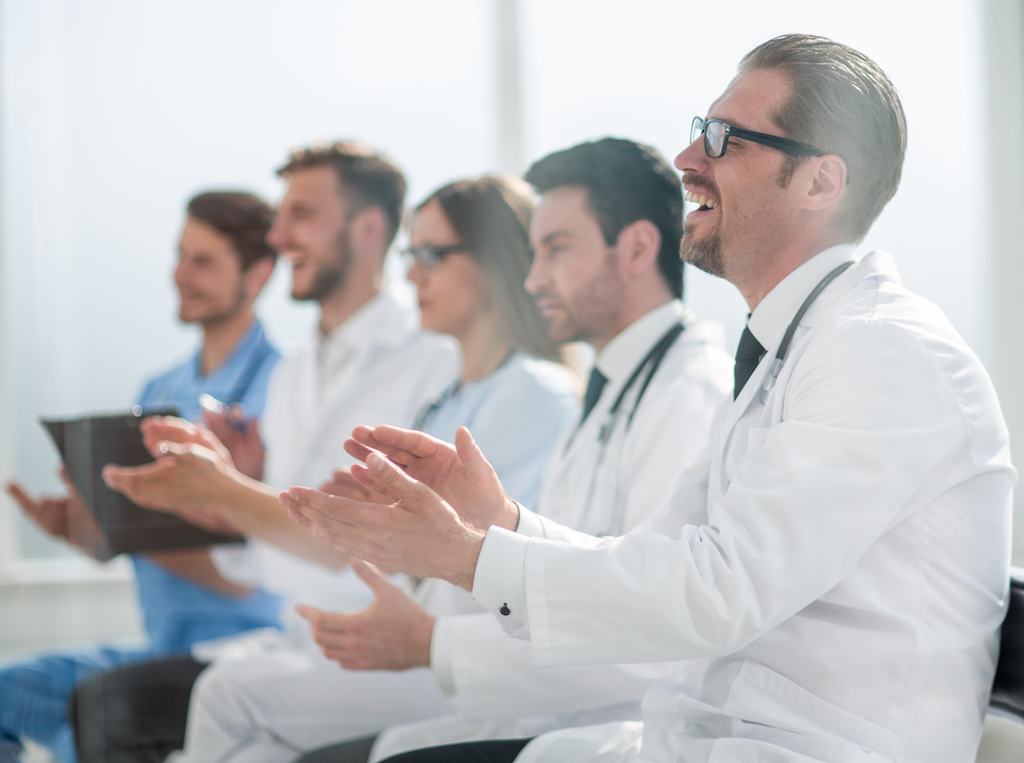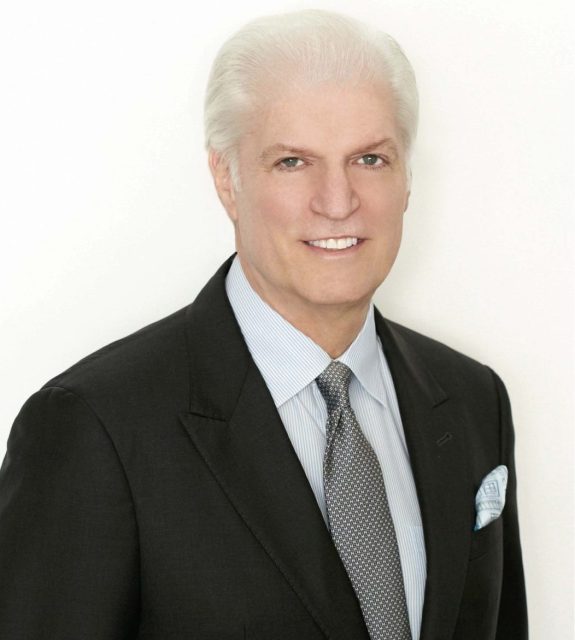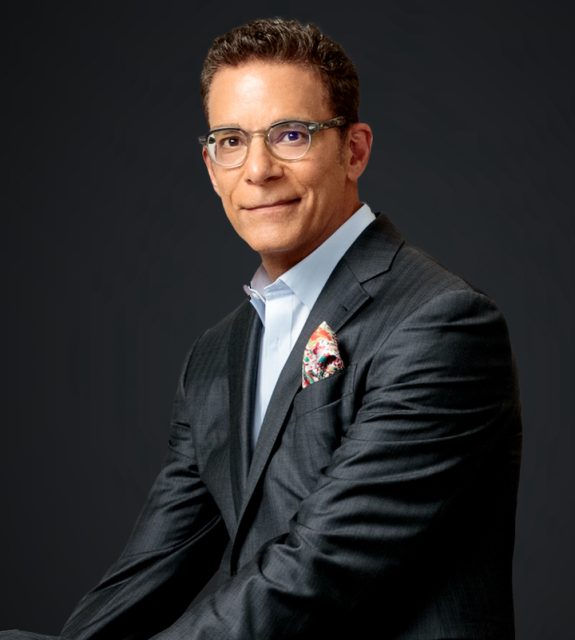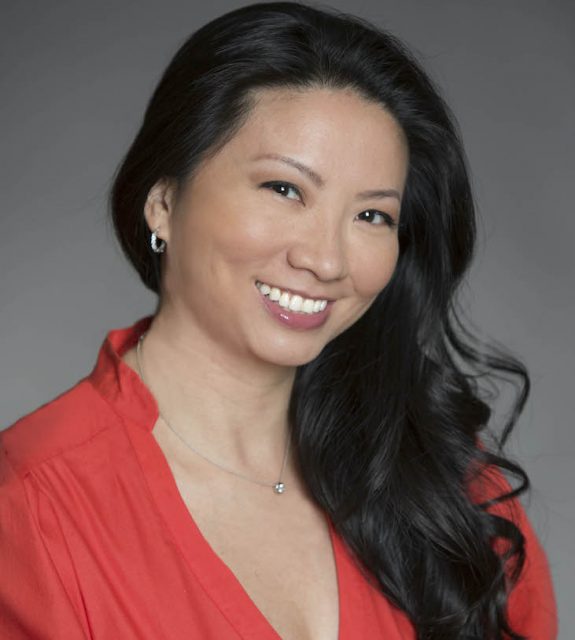 Photo Credit: Shutterstock
Photo Credit: Shutterstock
In the field of medicine, staying up-to-date with the latest techniques and technology is essential to provide the best possible care for patients. This requires a commitment to continuous learning and professional development. Healthcare professionals need to be well-versed in new research, breakthroughs, and advancements in their respective fields to deliver optimal outcomes.
To stay current with the latest trends and advancements in their field, medical professionals can take several steps. These steps may include attending seminars, conferences, and workshops, taking online courses and webinars, reading medical journals and publications, participating in research studies, and engaging in discussions with colleagues and experts in their field. Haute Beauty recently asked experts in the industry what they do to stay up-to-date, and here's what they shared.
Dr. Paul Durand, Careaga Plastic Surgery | Body | Miami, FL
As a plastic surgeon, I believe that staying up to date with the latest techniques and technology is crucial in providing the best possible care for my patients. Apart from attending national plastic surgery meetings and discussing new techniques with my colleagues, I make a point to continuously expand my knowledge and skill set.
One of the ways I achieve this is by teaching courses and conducting research in our field. By doing so, I am able to not only learn from my peers and stay informed of new developments but also share my knowledge and experience with others in the medical community. Last month, I had the privilege of being invited to speak at a world-renowned rhinoplasty meeting and course, where I also served as a faculty instructor.
I believe that as a physician, one can never stop learning and that it is important to not only stay current but also contribute to the advancement of our field through teaching and research. In addition to attending seminars and taking courses, it is also essential to actively participate in the medical community and share one's knowledge with others.
For more information, visit Careaga Plastic Surgery's website, Instagram, or Facebook!
Dr. Victoria Veytsman | Smile | London, Los Angeles, New York
In every field, things are constantly changing, and staying up to date with the progressions in every industry, particularly in medicine and dentistry, is of utmost importance. Over the course of my career, I have undertaken numerous hours of continuing education courses. Under the guidance and mentorship of some of the world's most talented clinicians, I have had the opportunity to work on patients.
These experiences have played a pivotal role in shaping my philosophy, refining my techniques, and developing my approach. It is in fact why I chose cosmetic dentistry! I saw how these dentists were really changing people's lives and I wanted to be a part of that.
Consequently, I remain committed to continuous growth by participating in various coursework and seminars. Learning is an ongoing process, and I firmly believe that no matter how long one has been practicing, you can never know everything. Throughout this process, I have picked up so many pearls and gems along the way, proving why you must keep elevating and expanding your knowledge and skillset!
For more information, visit Dr. Veytsman's website, Instagram, or Facebook!
Dr. Samuel Lin | Nose | Boston
I am always lecturing and attending meetings for plastic surgery, which allows me to learn about new techniques and technology in plastic surgery. I have a particular interest in technology and plastic surgery, and for years I have helped write and edit articles for our main journal Plastic and Reconstructive Surgery on topics related to technology. The technology that is commonly talked about is related to breast implants, skin tightening devices, and other skin treatments such as hair removal.
I also have been giving a lecture on Plastic Surgery and Innovation which has been our work for the past 16 years on new technologies to help patients. I have given this lecture when visiting several locations across the country and other medical institutions.
For more information, visit Dr. Lin's website, Instagram, or Facebook!
Dr. Mike Hoaglin | Mental Health | Oakland, CA
I stay up to date on techniques, technology, and medical knowledge in a few different ways. I run an evidence-based practice, so I keep up with the latest medical research by reading journal articles, listening to podcasts, and attending annual research and medical society meetings. I also keep up with innovations by talking to people: colleagues, vendors, and patients, of course. There is a great deal of innovation in technology and medicine, but I am very selective in using treatments and methods that have scientific validity, clinical utility and are shown to be cost-effective.
For more information, visit Dr. Hoaglin's website, Instagram, or Facebook!
Dr. Ella Faktorovich | Vision | San Francisco
I love science and innovation. I have always been involved in the research and development of new procedures, techniques, technologies, and medications. As a result of publishing and presenting different studies, I have to stay on top of the latest developments. This allows me to determine if a particular research direction I am interested in pursuing is new and how it contributes to the existing body of work. For example, my colleagues and I recently submitted a study on a new topical analgesic, a synthetic cannabinoid. In order to conduct this research and write a paper for a peer-reviewed publication, we had to review all the currently available pain relief therapies.
The second way for me to stay up-to-date with the latest techniques and technologies is to organize and lead the Annual San Francisco Cornea, Cataract, and Refractive Surgery CE Symposium. I have been doing it for 18 years and it is a fantastic way to connect with thought leaders in our field, to develop the program based on the latest advances, and then to hear the speakers present what’s new and exciting in our field.
For more information on Dr. Faktorovich visit his website, Instagram, or Facebook!
Dr. Jeffrey Lee | Breast | Boston
Keeping up with the latest trends and techniques requires a good amount of work. Conferences held by the big plastic surgery associations are usually held two to three times per year and there are two respected journals in the plastic surgery field that publish articles monthly. What I love doing more than the first two, even though I do all of it, is talking with other surgeons and it’s usually a two-way street when it comes to advice. During training, it is very common for people to gather and discuss their cases or upcoming cases. Having that same sense of camaraderie is more rare in private practice but definitely doable with the right amount of effort.
For more information, visit Dr. Lee's website, Instagram, or Facebook!
Dr. Brian K. Machida | Face | Los Angeles
I attend meetings to learn about new techniques in my field. If the techniques seem pertinent to my specific practice, I would attend a course to learn about the technique or read any written material or view any video presentations. During the last two years of Covid, it was very difficult to attend any live meetings or live courses because of Covid restrictions and I had to attend remote live video presentations. As Covid restrictions have eased, I hope to attend more live presentations.
For more information, visit Dr. Machida's website, Instagram, or Facebook!
Dr. Jason Bloom | Face | Philadelphia
It is very important to stay up-to-date on the cutting edge of technology and techniques within the field of plastic surgery. As the Co-Director of the University of Pennsylvania Facial Plastic Surgery Fellowship Program, it is necessary to stay current so that I can talk to the fellows and residents intelligently about the latest advancements in the industry and demonstrate them. I am constantly traveling to lecture on national and international stages where I am sharing information about how we are pushing the field forward with exciting new research and outcomes. I love to catch up with my fantastic friends and colleagues from around the world to discuss and share ideas at conferences and meetings multiple times throughout the year! I am extremely lucky to be invited to faculty at these conferences to teach and learn at the same time.
Often, the most important information and takeaways from the meetings happen in discussing different topics with friends and surgeons outside of the walls of the actual lecture halls, but when we see each other and get together to catch up. Additionally, I work with aesthetic industry companies and partners to host cadaver dissection labs where were work on anatomy and technique approaches and also learn about the newest products and devices that are on the horizon and upcoming. That allows me to pass that knowledge on to my team at Bloom Facial Plastic Surgery and ultimately to our patients. Our patients look to our practice to bring them the safest, most effective, and most advanced treatments available! That can only come from staying sharp and keeping our skills and knowledge base current!
For more information, visit Dr. Bloom's website, Instagram, or Facebook!
Dr. Susan B. Fox | Medical Aesthetics | Fort Lauderdale, FL
Every year, I attend multiple in-person conferences and am a part of several online learning platforms. I also make it a priority to attend at least one cadaver course for injectables. I love learning and always look forward to these opportunities to gain new knowledge and techniques.
For more information, visit Dr. Fox's website, Instagram, or Facebook!
Dr. Nilay Shah | Breast | New York, NY
As a plastic surgeon, it is crucial for me to provide safe and effective treatment to my patients. To achieve this goal, I continually strive to stay up-to-date with the latest techniques and technology in my field. I actively participate in various online and in-person meetings and seminars hosted by highly reputable and accredited organizations in plastic surgery such as the American Society of Plastic Surgery (ASPS), American Society of Aesthetic Plastic Surgery (ASAPS), and Dallas Rhinoplasty Symposium.
To maintain my skills and knowledge, I attend at least one seminar or course each year. Additionally, I reference online video modules to stay current with new techniques and technology. However, I do not blindly adopt every new technique or technology that becomes available. It is essential to thoroughly research and evaluate each one to determine its safety and effectiveness. Therefore, I devote a significant amount of time to investigating new techniques and technology before implementing them into my practice. Ultimately, my priority is to provide the best possible outcomes for my patients while ensuring their safety.
For more information, visit Dr. Shah's website, Instagram, or Facebook!
Dr. Yuly Gorodisky | Brazilian Butt Lift | Oxnard, CA
Continuing education is essential for any medical professional, and plastic surgeons are no exception. To stay current with the latest techniques and technology, I typically attend seminars, workshops, and conferences several times a year. These events help to refresh and expand my knowledge and fine-tune my techniques through shared experiences with other surgeons and learning about new advancements in the field. Additionally, I occasionally participate in online courses, webinars, and other forms of distance learning. These options can be convenient for busy surgeons who cannot always travel to attend in-person events. Overall, plastic surgeons must commit to lifelong learning to ensure that they are providing their patients with the highest level of care. By staying up-to-date with the latest techniques and technology, they can offer the most advanced and effective treatments to their patients.
For more information, visit Dr. Gorodisky's website, Instagram, or Facebook!
Dr. Jeffrey Lisiecki | Nose | New York, NY
The best surgeons are always learning and improving, evaluating their results, and striving to make them even better. I take a number of steps to make sure that I stay up to date and continually improve and to stay involved with the dialogue about the latest and best techniques. I attend and speak at many of the major plastic surgery conferences. I write academic papers and textbook chapters about the procedures I perform, and I am also a peer reviewer for two major journals in plastic surgery, Plastic and Reconstructive Surgery and the Aesthetic Surgery Journal.
The most important thing, however, is the dialogue between surgeons. I am fortunate to count among my friends and colleagues many true experts in aesthetic plastic surgery, from facelifts and rhinoplasty to breast and body surgery. There is a constant dialogue between surgeons about difficult cases, improving techniques, the application of new technologies, and how to deliver better and better results for our patients. These conversations are the most valuable way to stay up-to-date and share our experiences honestly with each other.
For more information, visit Dr. Lisiecki's website, Instagram, or Facebook!
Dr. Sam Rizk | Face | Manhattan, NY
This is a great question, as plastic surgery is in a constant state of evolution—and for this reason, there is never a day when I'm not pushing myself to do better for my patients. You cannot strive to be the best in your field if you are not absolutely committed to embracing every opportunity to learn, whether that means attending conferences, participating in online learning modules, or doing surgical observation. Travel is a huge part of this; it's so important for me to get out there and see what facial plastic surgery looks like in other parts of the world. Not long ago, I took the opportunity to run a Brazilian facial plastic surgery section in San Paolo, and I spent a lot of time teaching at conferences around the globe. Over the years, I've developed symbiotic relationships with some of the top surgeons in the world; we are constantly traveling back and forth to observe each other's most innovative procedures.
Without this commitment to learning and growing, I would not have been able to perfect my deep facelift/neck lift procedure. I am one of just a few surgeons, globally, who do not use a postoperative drain, which results in less post-op pain, infection risk, trauma to skin and blood vessels, and bruising. This is a procedure that heals very quickly and results in a very natural, unpulled look with very few if any, side effects. In fact, in 2008 I published the first article on the deep plane facelift without a drain in the Archives of Facial Plastic Surgery, and since then my hematoma rate (a very common side effect of facelifts) is less than two percent, versus the general hematoma rate of 10 percent. This is something that I'm known for among my colleagues—but the irony is that without taking advantage of opportunities to observe and learn from them, the innovations I've developed would not be possible.
For more information, visit Dr. Rizk's website, Instagram, or Facebook!
Dr. Husam Almunajed | Smile | New York, NY
When graduating from Dental School, you really just dip your toes into the profession. Like in all fields, art, and sports, it is very crucial to have a mentor that helps and guides your path. Your path is likely to change, but it's important to keep advancing to not only keep your skills current but to learn more skills. Just like high school athletes, they may transform into college-level players, and some of these college-level players transform into professional-level athletes. The same goes for Dentistry, as over 90 percent of dentists are still not aware of all the treatment options and how to treat people well in a consistent and predictable way.
Our patients trust us to make good choices for them. We owe it to them to continuously upgrade the technologies we work with, the materials we use, and the protocols that must be put into play to safely restore oral health. It's no longer acceptable, in my opinion, to use substandard materials and outdated methods. Most doctors and dentists in the private sector get to choose the materials they use and are under no obligation to buy the best materials or the latest technologies. Updating the technology and materials we use is as vital as updating science and knowledge. This is why constant education is important and conferences, symposiums, seminars, academies, and meetings are a must. We must never stop investing and learning if we want to stay ahead.
For me, I was fortunate to have found a mentor that had his own cosmetic dentistry institute, which I would attend while I was still in dental school. This really opened my eyes to the profession of cosmetic dentistry, and I attended all his continuums, as well as all his hands-on conferences with patients. As with anything, more doors open, and you get exposed to other conferences around the country, as well as the world, that pushed me to attend in striving to learn from the best in the world. This does go full circle, as after attending my mentor's hands-on conferences with live patients many times, I was asked to become a clinical instructor to teach dentists from all over the world, and it's been an amazing opportunity and responsibility. Even now, our eyes are still open, and believe the golden age of dentistry is yet to come!
For more information, visit Dr. Almunajed's website, Instagram, or Facebook!
Dr. Alton Ingram | Body | Nashville, TN
As a board-certified cosmetic surgeon with over three decades of experience, staying up-to-date with the latest techniques and technology in plastic surgery is of utmost importance to me. I understand the significance of providing my patients with the best possible care and keeping my skills and knowledge current is a crucial aspect of achieving that goal.
To stay up-to-date with the latest developments in plastic surgery, I follow a comprehensive approach that includes teaching other surgeons and learning from the world's experts at seminars and conferences, joining and assuming leadership roles in professional organizations, serving on the editorial board of three medical journals, and participating in training and continuing education courses.
In the last year, I have lectured on patient safety at three international meetings and was honored to be a course director for a live training on surgical techniques and patient safety at the University of California San Diego's Center for the Future of Surgery. Lecturing and teaching at these meetings is time-consuming, but attending this sort of seminar and conference provides me with the opportunity to learn about the latest techniques and technology in plastic surgery, and to gain insights into new research and best practices regarding patient safety and surgical techniques. I regularly attend national and international conferences such as the American Academy of Cosmetic Surgery's (AACS) annual meetings, and this fall I will be lecturing in Dubai (I'm really looking forward to the trip) on patient safety and best practices in cosmetic surgery.
Joining professional organizations such as the American Board of Cosmetic Surgery (ABCS) and the AACS also helps me stay up-to-date with the latest developments in plastic surgery. As a board member of the ABCS and a member of the organizing committee for the AACS's 2024 annual scientific meeting, I have access to research and publications, educational resources, networking opportunities, and other benefits that help plastic surgeons stay informed and connected with others in their field.
Reading journals and publications is another essential aspect of staying up-to-date in plastic surgery. I am on the editorial boards of the American Journal of Cosmetic Surgery, Modern Research in Plastic and Reconstructive Surgery, and the International Journal of Clinical and Medical Case Reports. I also regularly read other scientific journals and publications such as Plastic and Reconstructive Surgery, Aesthetic Surgery Journal, and The Journal of Plastic, Reconstructive & Aesthetic Surgery. These publications provide me with the latest research and advancements in the field of plastic surgery, which help me improve my skills and knowledge.
Finally, participating in training and continuing education courses is another effective way to stay up-to-date with the latest techniques and technology in plastic surgery. I currently have a postgraduate fellow visiting my practice to train in cosmetic surgery techniques, and I frequently participate in training and continuing education courses regularly to improve my skills and knowledge, stay current with the latest developments, and enhance the quality of care I provide to my patients.
Staying up-to-date with the latest techniques and technology in plastic surgery is critical for providing the best possible care to my patients. Presenting at and attending seminars and conferences, joining professional organizations, publishing and editing research, keeping up to date with scientific journals and publications, networking with other professionals, and participating in training and continuing education courses are all essential steps I take to ensure that my skills and knowledge are current and up-to-date.
For more information, visit Dr. Ingram's website, Instagram, or Facebook!
Dr. S. Alexander Earle | Body | Miami, FL
Becoming a double-board certified plastic surgeon was a big undertaking that required many years of school, exams, fellowships, and residencies. However, that was only the beginning. In order to provide the highest level of safety and service to our patients at PURE, continuing my education journey and staying up to date on innovative techniques, technology, products, and procedures is a part of my job that I take seriously.
As the president of the World Association of Gluteal Surgeons (WAGS) and a member of the American Society of Plastic Surgeons, I take many opportunities to attend conferences, meetings, and hands-on educational seminars to learn from colleagues. At these events, I find ways to advance my skills, learn how to improve my craft and deepen my artistry. In many of these educational opportunities, I teach others about the technical advances that have improved our practice and the way we perform surgery, such as using ultrasound technology during Brazilian Butt Lift (BBL) surgery.
Regular meetings with medical technology experts who share the latest advancements in equipment from cannulas to lights in the operating room (OR) allow us to provide the safest surgeries possible, often reducing the time patients spend under anesthesia. Having strong relationships in the medical supplies industry helps us to receive the technology before other practices, which gives us an advantage in our field.
Many advances in the techniques used at PURE come from our team and how we monitor and track trends in the industry and the changing desires of our patients. For example, we created PURE’s signature South Beach Brazilian Butt Lift (SoBeBl) for patients who indexed lower BMI levels, but who wanted to have a BBL procedure. The traditional BBL left many patients out of the experience, and we found a technique that allows us to be more inclusive. We also heard from our patients that they wanted to have less visible scarring after surgeries, and we found ways to better hide them – and in some cases, totally eliminate visible scars on the body.
Other vehicles for continuous improvement are books, medical journals, and feedback from clients. Learning from others’ experiences has been a game-changer in avoiding many negative situations in our practice. These accounts of others’ findings in medical publications inspire us to make timely updates to our procedures to ensure we are following best practices for safety protocols. Feedback from clients in real-time helps to constantly reevaluate how to provide a best-in-class surgery experience for our patients.
For more information, visit Dr. Earle's website, Instagram, or Facebook!






















